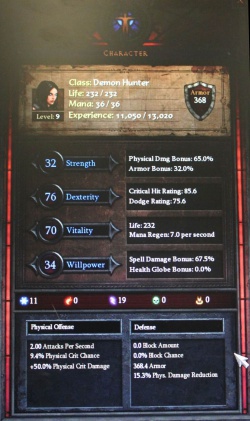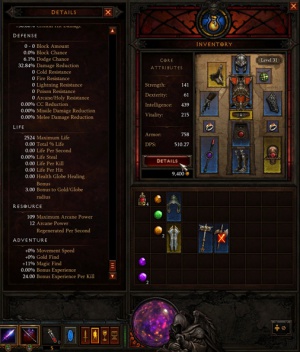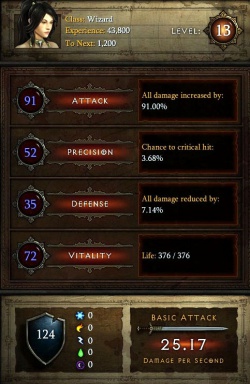Difference between revisions of "Attributes"
| Line 41: | Line 41: | ||
[[Vitality]] governs the amount of [[Life]] a character has.<br> | [[Vitality]] governs the amount of [[Life]] a character has.<br> | ||
'''Each point of Vitality gives:''' | '''Each point of Vitality gives:''' | ||
| − | *+ | + | *+X to [[Life]], where V = [[Vitality]] and L = level: |
| − | If player level < 35 | + | |
| − | If player level ≥ 35 | + | |
| + | If player level < 35 (10 life per vitality.): X = V*10 + 40 | ||
| + | |||
| + | If player level ≥ 35 (level - 25 life per vitality.): X = V*(L-25) + (L-25)^2 + 40 | ||
| + | |||
Thus at level 60, each point of vitality adds 35 life. | Thus at level 60, each point of vitality adds 35 life. | ||
| + | This does not including +40 base life and additional life gained above level 35, as illustrated in the functions above. | ||
==Other Attributes== | ==Other Attributes== | ||
Revision as of 07:43, 10 June 2012
| Beta Content A significant portion of this article deals with development / pre-release / Beta content. A request has been made for it to be updated. List of Beta Content Pages |
Diablo III's core Attributes are Strength, Dexterity, Intelligence, and Vitality. Different classes get different bonuses from these attributes. Each one can be broken down into other, more fundamental attributes.
Examples of other attributes are Armor, Crit Chance, and Attack Speed. Many more exist, and they are described in this article.
A player's attributes can be increased by their gear or talents. Not all items can have every type of attribute.
Contents
Core Attributes
This lists the four core attributes and their precise effects, as of patch 1.0.2.[1]
Strength
Strength governs how much Armor a character has and increases Barbarian's damage dealt.
Each point of Strength gives:
Dexterity
Dexterity governs the chance that a character will Dodge an attack and increases Demon Hunter's and Monk's damage dealt.
Each point of Dexterity gives:
- +1% to Demon Hunter's damage.
- +1% to Monk's damage.
- +x% to Dodge chance:
1 - 100 gives 0.1% per dexterity 101 - 500 gives 0.025% 501 - 1000 gives 0.02% 1001 - 8000 gives 0.01%
Simply: If you have >1000 dexterity, +dodge is 30% + (dex - 1000)*(0.01)
Intelligence
Intelligence governs the amount of Life a character gains from Health Globes and increases Wizard's and Witch Doctor's damage dealt.
Each point of Intellect gives:
- +0.1 per point to Resistances.
- +1% to Witch Doctor's damage.
- +1% to Wizard's damage.
Vitality
Vitality governs the amount of Life a character has.
Each point of Vitality gives:
If player level < 35 (10 life per vitality.): X = V*10 + 40
If player level ≥ 35 (level - 25 life per vitality.): X = V*(L-25) + (L-25)^2 + 40
Thus at level 60, each point of vitality adds 35 life.
This does not including +40 base life and additional life gained above level 35, as illustrated in the functions above.
Other Attributes
Armor: This reduces ALL damage done to the player by some percentage. This includes magical damage.
%damage reduction by armor = [Armor/(Armor+Mlvl*50)]*100 where Mlvl is the level of the attacking monster.
Critical Hit Chance: When a player attacks, they have a chance of hitting with a significantly higher damage than usual. This chance is their "crit" chance. Players have a base of 5% crit hit chance, with a crit damage of 150% normal damage. Items with +Critical Hit Chance can be found.
Critical Hit Damage: This is the amount of damage that a critical hit does. The base is 150% of normal damage. Items with +Critical Hit Damage can be found.
Core Attribute Changes
The core attributes have undergone significant changes since conception. The Diablo 3 beta had a fifth attribute named willpower, which no longer exists.
Attribute changes in 2012
On Janruary 19, 2012, Diablo III Game Director Jay Wilson made a lengthy blog post on various upcoming system changes[1] in Diablo III. These changes included a complete overhaul on the attribute system.
Strength and Dexterity made a comeback while Vitality stayed the same. A new attribute was introduced to the game - Intelligence. Stats that came with the old attributes have been moved onto item affixes. +Armor and +Physical Resist is taking over Defense and +Chance to critically hit will replace Precision.
Itemization was the main reason behind the attribute overhaul. With the old attribute system, almost every item was useful to every class. For example, Barbarian's equipment was as useful when used by the Wizard and vice-versa (except for the class-based items). The new attributes specifically targets stats at classes to reduce item overlap and diversify the item pool. In addition, character stats are now displayed on the inventory interface.
Attribute changes in 2010
Originally, each attribute affected more character properties in Diablo III than in D1 or D2. This was part of the D3 Team's design goal; to make all of the attributes useful to all of the classes. On December 20, 2010, that changed when D3 Community Manager Bashiok made an announcement[2]on the Battle.net forums of the new attribute system in which each core attribute affects a single property.
This change wasn't as controversial as the pre-set attribute announcement, but Bashiok's post did generate a lively 26-page debatein the forums. Bashiok made several points in favor of the change, and several less-favorable points were made in the forum. The debate is distilled here:
Pros
- None of the old attributes helped control resource management.
- Easier to make all attributes valuable to all classes.
- Before, in some cases it was not obvious what attribute affected a particular skill.
- Makes core attributes simple and straightforward to understand.
- Makes game balance easier.
- Makes valuing item stats easier.
- No character has a primary attribute.
Cons
- It wasn't that confusing, especially with pre-set attributes.
- Feels like a dumbing-down of the game.
- Having all attributes equally valuable to all classes is not always beneficial.
- No character has a primary attribute.
- The attribute names are uninspiring.
Old Attribute System
See the respective pages on Attack, Precision, Defense and Vitality (didn't change) to see how the attributes used to look like in the beta (before the attribute changes in 2012).
 BlizzCon 2010 when str/dex/vit/will were last seen.▼ |
Even Older Attribute System
See the respective pages on Strength, Dexterity, Vitality, and Willpower (renamed from Energy in D2) to see what attributes originally looked like.
No Customizable Attributes
The biggest change about attributes in Diablo III is that they will no longer be player-assigned on level up. This means that two "naked" characters of the same class and of the same level will have the exact same attack, precision, vitality, defense, and willpower, as well as the same hit points, resource value, damage, and etc. Except that they won't, since differences in their skills, skillrunes, and traits, not to mention equipment, including charms/talisman, will make them very different.
Though this seems a settled issue as of late 2010, it was highly-controversial when it was first revealed, back in late 2009. Jay Wilson explained it, as best he could in those days long before charms, the talisman, gems, or traits had been revealed. [3]
Pre-Set Attributes Removed
Much digital ink has been spilled on this issue, since it was revealed at Blizzcon, in October 2008. (The first word came from an interview by Diii.net, and immediately resulted in a 30-page forumthread.) Some portion of that hew and cry was spurred by an initial misunderstanding; reporters assumed items would still have strength, dexterity, and other attribute requirements (they do not), but even with that issue clarified shortly after, the topic of pre-set attributes has remained a contentious one.
There are a variety of arguments on each side of the issue. The debate was nicely encapsulated in an On the Drawing Board column about pre-set attributes, from which the following bullet points are taken: [4]
Pros
- Manual setting is no longer needed, as there are no stat requirements on items any more.
- It's beginner friendly. New players won't ruin their characters with poor stat allocation.
- Attributes were largely irrelevant in D2, since all characters with the same build used identical equipment and stat allocation. Typical D2 guide advice, "Enough strength for your heaviest item, then all the rest into vitality."
- Enables easier/better game balancing for the developers, since they can know about how powerful characters will be.
- Prevents twinking and other exploits by low level characters.
- World of Warcraft uses auto-attributes, and it's the most popular RPG ever.
- No need for attribute respecs, which would otherwise have to be incorporated since skill respecs will be.
- It boosts the importance of items, since those and skills are what differentiates characters.
- High level characters can use the items they find, since they won't, for example, be built with far too little strength for that cool new item they just found.
- It respects traditional RPG philosophy of archetype characters in the sense of how a physical and mental ability of a class is supposed to be depending on its role. A Barbarian with very high Willpower or a Wizard with too much Strength really makes no sense from roleplaying perspective in a fantasy game.
- It completely eliminates situations when people find a better items with more points in stat X and realize that they have one or more unnecessary invested points right now in stat X just because of these new items and those points could be relocated in other stat for better purpose. Maybe later on they will need those permanently invested points in stat X, but not right now. The problem is that it will never end, until they will find all items perfect and reroll their characters.
- Rerolling is fun but rerolling because of messed stats is not fun.
Cons
- Reduced Character Variety. Unusual and non-cookie cutter builds need to allocate their attributes differently.
- We won’t be noobs forever. Why gimp a major aspect of game play individuality when it won't be necessary once gamers have some experience?
- No Attributes = No skill required. If players want to mainline strength and ignore vitality because they're good enough to survive with fewer hit points, or vice versa so they can play with a weaker, specialized build, why take away that option?
- Rerolling is fun. Making new characters is a hallmark of the Diablo series. This isn't WoW where one high level character takes months to build, and then lasts forever with respecs.
- What about hardcore? HC chars want/need to be built very differently than SC, since death is forever.
Blizzard's Response
The D3 Team never issued a formal, multi-point rebuttal, but they have commented on this issue a few times, being careful not to give away their plans for stat customization via systems, such as gems, traits, and the talisman, that they weren't yet ready to reveal.[ [5]]
The longest comment came from D3 Community Manager Bashiok who offered a detailed argument in a forum post in December 2008. [6]
With the current skill system, runes, and item affixes, as well as other unmentionables, there’s not going to be any issue with not having enough customization. If there is, bottom line, we’ll add more. We’re not going to release a game we’re not happy with, and a lack of character customization options would make us unhappy. But, even right now we have a lot more variety and ability to customize a character than Diablo II had.
Odd character builds:
Similarly is being able to create “off-spec” builds, or characters that aren’t just cookie cutter ideals of the class you’re playing. This is important to the game, and we will ensure that it doesn't get "tuned out" of the game. ...Manual attributes were not what made them possible in Diablo II. The ability to make these types of characters relies solely on the complexity and diversity of the the options available to steer your character, and not that they come in the form of a "+" button.
Less feeling of level up achievement:
- The loss of a feeling of a leveling achievement is actually something we recognize and intend to address.
We've always assigned our own points in Diablo games:
- The nostalgia of simply having points, and spending them on base stats is probably the most difficult. Liking something because it’s familiar is difficult to argue with, but it’s also probably the easiest to overcome. Since we can’t force your memories out of you, we just have to make the best game we can and hope you realize that manual attribute assignment isn’t the best, most engaging or entertaining form of character customization possible, and that we’re offering an even deeper and richer game without those buttons.
Though this issue continues to emerge in comments and forum posts, the Diablo 3 team has shown no inclination to undo their changes to this aspect of the game.
References
| Items of Diablo III [e] Item Basics Normal Items Crafting Legendary Armor I Legendary Armor II Legendary Weapons 1h Legendary Weapons 2h Item Sets |
|---|

